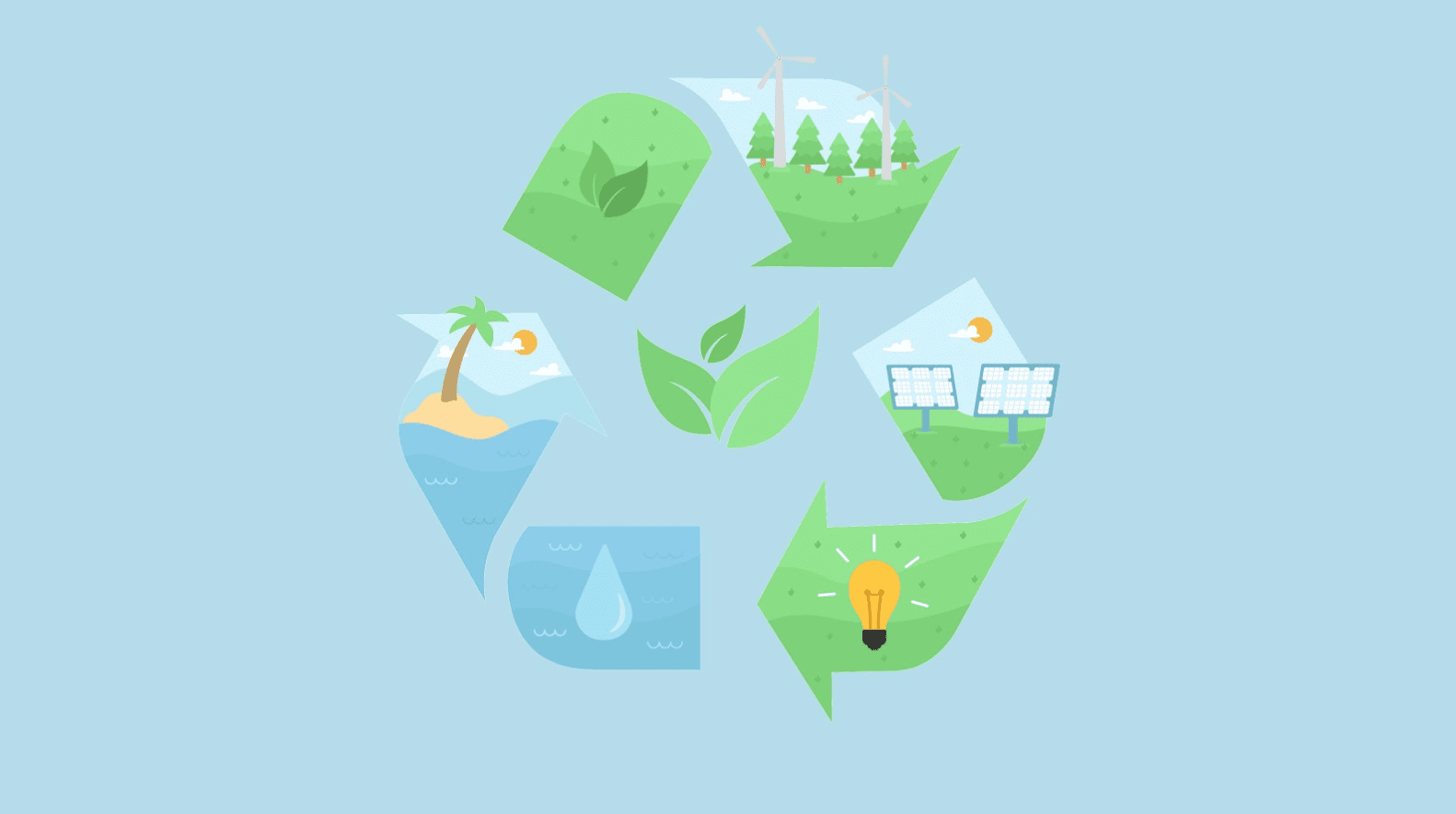
Interactive Checklist for Sustainable Events:
A Guide for Event Managers
More than ever, sustainability is at the top of the agenda for event planners, as it is a top priority for event participants. As major producers of waste and consumers of valuable resources, event managers are faced with the challenge of making their events more sustainable.
The event industry is making significant efforts to reduce this impact, from optimizing energy consumption to minimizing waste.
To address these challenges, we have developed the most comprehensive and interactive sustainable event checklist available. This checklist is a practical tool aimed at helping event managers to effectively transform events and promote sustainability at all levels.
Are you ready to take on this challenge and make your events more sustainable? Structure and optimize your sustainability efforts by downloading the full interactive checklist here.
Sustainability at Events as the Basis for Future Event Success
The organization of events contributes significantly to environmental pollution worldwide. From large conferences to small gatherings, they generate vast amounts of waste and consume a considerable amount of resources. Integrating sustainability into event planning means not only minimizing the environmental footprint, but also increasing social responsibility and improving economic efficiency.

Your interactive checklist for sustainable measures at events.
Event managers also face the constant challenge of keeping pace with the sustainability efforts of their companies and clients. This requires an ongoing commitment to sustainable practices and the implementation of effective measures to meet these requirements. Through sustainable practices, events can help conserve natural resources and protect biodiversity while promoting community well-being. In addition, participants are increasingly responding positively to environmentally conscious initiatives, which improves brand perception and participant loyalty.
For more in-depth insights and practical tips on how you can make your events more sustainable, we recommend our article "Green Events", which presents tried-and-tested methods and innovative approaches.
Glossary: The most important terms in the checklist for sustainable events
In order to make the best use of the checklist for sustainable events, it is helpful to understand some of the key terms used in it:
ESG (Environmental, Social, Governance): Refers to environmental, social and governance standards used to assess the sustainability and ethical impact of an organization.
Carbon offsetting: Measures to offset the CO2 emissions of an event by investing in environmental projects such as reforestation or renewable energies.
Reusable resources: Materials or products that can be used multiple times in order to reduce waste and optimize the use of resources.
Zero Waste: A principle that aims to completely eliminate or significantly reduce waste through strategies such as recycling and composting.
Sustainable procurement: The purchasing process that aims to source products and services that have minimal negative impact on the environment and promote social justice.
Inclusivity: Ensuring that events are accessible and welcoming to all people, regardless of physical or sensory limitations.
This glossary explains basic terms that will help you to fully understand the checklist and use it effectively to plan your sustainable events.
How This Event Checklist Works
Our Sustainable Event Checklist is an interactive Google Sheet tool designed to guide event managers through the process of planning and executing sustainable events. Here we explain how you can use the checklist effectively:
Download and personalization: First you should download the checklist here. As it is interactive, you can adapt it directly to your specific needs.
Carrying out the assessment: Each category of the checklist contains a series of questions that you can answer with "Yes" or "No". These answers will help you to identify areas in which your event is already well positioned and those where there is potential for improvement.
Use expert tips: For every question that is answered with "No", the checklist offers an expert tip. These tips provide valuable insights and suggestions on how you can improve specific aspects of your event.
Progress tracking: The checklist also includes a progress bar that shows you how close you are to achieving a fully sustainable event. This allows for continuous evaluation and motivation during the planning process.
Customization and expansion: You can add up to two custom tasks to each list to ensure that any specific requirements or objectives of your event are taken into account.
In this article we only present a preview of the questions. To access the full interactive checklist, download it here.
Event Communication
Efficient communication is the key to any successful event and offers considerable potential for sustainability. By using digital event communication, you can drastically reduce paper consumption while ensuring effective, timely dissemination of information.
Digital and efficient: Sustainable event communication saves paper and increases reach.
Do you use digital platforms for all event communication to reduce paper consumption?
Is your event marketing focused on highlighting the sustainability efforts and benefits of the event?
Do you offer electronic event ticketing and registration options to minimize paper waste?
Have you ensured that all digital communication tools are accessible for people with disabilities?
Are your event marketing strategies inclusive, with language that takes all demographics and backgrounds into consideration?
Do you actively use social media to interact with participants before, during and after the event?
Event Registration
Registration is often the first point of contact for participants and provides an excellent opportunity to implement sustainability principles. By offering digital and paperless registration, you can reduce material consumption and increase efficiency.
Simpler and more environmentally friendly events with digital registration.
Do you use event registration software to minimize the use of paper forms and mailings?
Do you use the data collected during registration to plan resource allocation more effectively, such as seating, materials and food?
Are your registration processes integrated with mobile technology that allows attendees to use their smartphones for event check-in and information retrieval?
Have you considered the environmental impact of your registration badges and materials?
Are you using the data collected during registration to improve the sustainability of the event, such as dietary preferences and accessibility needs?
Travel & Transportation
Mobility plays a crucial role in the environmental footprint of an event. By promoting environmentally friendly travel options such as public transport or the use of bicycles, you can significantly reduce the carbon footprint of your event.

Promotion of bicycles and public transportation for sustainable events.
This category provides guidelines on how to choose and organize transportation that is both practical and sustainable.
Have you made sure that the venue is accessible by public transport, bicycle or on foot?
Are secure bicycle parking spaces available at the event location?
Do you offer incentives for participants who travel by environmentally friendly means of transportation?
Are comprehensive eco-friendly travel options readily available and communicated to all potential participants?
Do you offer environmentally friendly transportation options such as shuttle services, carpooling or bike cab services when public transportation is not practical?
Venue
The choice of venue can have a significant impact on the sustainability of your event. An environmentally friendly venue not only reduces the need for resources, but also improves the experience for participants.

The right place: Environmentally certified locations as a basis.
This category helps you choose places that meet environmental standards and promote sustainable practices.
Does the selected venue have a strong environmental policy and sustainability certifications?
Are existing buildings and areas used to avoid the need for temporary structures?
Is there a maintenance plan if your event takes place outdoors in a natural environment?
Is the accommodation for participants environmentally certified or recognized for its sustainable practices?
Does the venue support and provide facilities for participants with disabilities to ensure inclusivity and accessibility?
Are the facilities at the venue equipped with energy-efficient lighting and climate control systems?
Food & Drink
Catering options have a major impact on the environmental impact of an event. By choosing local and seasonal food, reducing food waste and avoiding disposable products, catering can be made more sustainable.

Regional and seasonal: sustainable catering with local options.
This category offers approaches on how you can offer your participants delicious and environmentally friendly food.
Have you selected catering services that prioritize local and seasonal food sources?
Do you offer vegetarian and vegan food to reduce the carbon footprint associated with animal products?
Do you avoid single-use plastics and disposable tableware when catering?
Do you use bulk dispensers for condiments and drinks to minimize individual packaging?
Are you avoiding bottled water by providing water dispensers for refillable bottles?
Have you made arrangements for leftover food to be donated to local shelters or food banks?
Waste Management & Recycling
Effective waste management is crucial for reducing the ecological footprint of an event.

Zero waste at a glance: Effective waste management through recycling.
This category focuses on strategies to minimize waste through recycling, composting and choosing reusable materials. It shows how you can plan and implement a zero-waste event.
Have you made arrangements for the placement of recycling and compost bins throughout the venue that are clearly labeled to avoid contamination?
Do you use signs made from recyclable or reusable materials to guide proper disposal practices?
Do you work with suppliers and caterers who are committed to minimizing plastic and prioritizing environmentally friendly packaging?
Do you have a plan for disposing of electronic waste, such as used batteries or old devices?
Do you encourage participants to bring their own reusable items such as water bottles, coffee cups and cutlery?
Energy & Water
Managing energy and water consumption effectively means acting sustainably.

Use of renewable energies and energy-saving technologies at events.
In this category you will find tips on how to minimize the consumption of these resources while ensuring that your event runs smoothly. From using renewable energy to implementing water-saving measures - every action counts.
Does your event use energy from renewable sources such as solar, wind or hydropower?
Are all lighting and AV devices at the venue energy-efficient, such as LED lighting and energy-saving devices?
Have you implemented water-saving measures, such as low-flow taps and toilets or water treatment systems?
Is there a system in place to monitor and control heating, ventilation and air conditioning (HVAC) to minimize energy waste?
Do you engage participants about the importance of energy saving and water conservation during the event?
Health & Safety
Ensuring health and safety at events is essential, not only to meet legal requirements, but also to create a positive experience for everyone involved.

Sustainable events take into account the well-being of the participants.
This category is all about how you can ensure that your event is not only environmentally sustainable, but also healthy and safe for all participants.
Have you integrated health and safety considerations into the planning of all event areas to ensure they comply with local regulations and promote wellbeing?
Are the sustainable materials used in the event design non-toxic and support good indoor air quality?
Do your event's food and beverage offerings follow health-conscious and safe practices, such as offering allergen-free options and clear labeling?
Have you considered participants' wellbeing in terms of mental health and provided areas for relaxation and rest?
Social Responsibility
Events offer an excellent platform for achieving positive social impact.

Sustainable events promote social responsibility and community.
This category emphasizes the importance of inclusivity, diversity and supporting local communities. It shows how your event can be not only environmentally but also socially responsible.
Have you considered the socio-economic impact of your event on the local community?
Does your event actively involve local communities in the planning and delivery and provide economic benefits for them?
Does your event provide opportunities for underrepresented groups to participate, speak or perform?
Are there clear policies and practices in place to ensure diversity and inclusion at your event to accommodate participants from different backgrounds?
Giveaways
Giveaways are a common practice at events, but can also be a source of waste.

Sustainable gifts: practical and environmentally friendly promotional items for events.
This category helps you to choose sustainable promotional gifts that are both useful and environmentally friendly and gives tips on how to avoid unnecessary waste.
Are your event giveaways practical, reusable or made from sustainable materials?
Are you sourcing corporate gifts from local suppliers to reduce the carbon footprint associated with transportation?
Have you considered digital giveaways, such as discount codes, e-books or online courses to eliminate physical waste?
Do you actively communicate the sustainability features of your giveaways to participants?
Do you minimize the packaging of giveaways by using recycled or recyclable materials where necessary?
Evaluation After the Event
Evaluating your sustainability efforts is critical to making improvements and measuring success.

Sustainability assessment and feedback after the event are essential.
This category provides methods for measuring and analyzing the environmental and social impact of your event to ensure that your goals are achieved.
Do you use a sustainability reporting system to track and measure the environmental impact of your event?
Are Net Promoter Score (NPS) surveys conducted to collect feedback from participants specifically on sustainability practices?
Do you conduct a comprehensive post-event debrief with your team to discuss what worked and what didn't in terms of sustainability?
Are the results of sustainability efforts communicated in order to maintain transparency and build trust among stakeholders and participants?
Do you work with external auditors or consultants to validate the sustainability claims and performance of your event?
It’s Time for More Sustainability at Events
Organizing a sustainable event can be easy if you have the right tools at hand. Our checklist for sustainable events is a crucial step in this direction by showing you concrete measures and practices you can use to make your events more environmentally friendly.
Use event management software and modern technologies to make your events more efficient and sustainable. Today, not tomorrow, is the best day to start. Create your Sweap account now and access the full interactive checklist with detailed expert tips. Start making your events more sustainable now. Create your free account now and create your first sustainable events.
